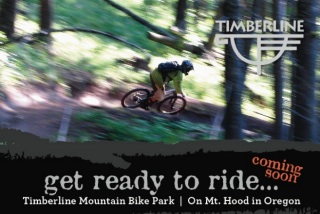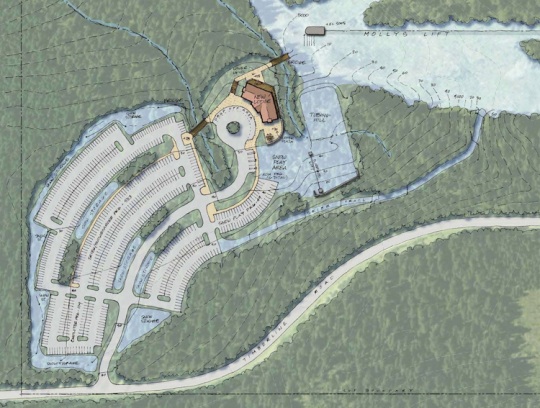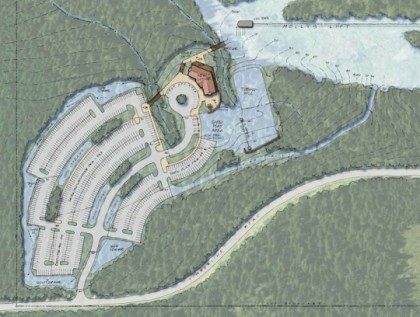
A coalition of environmental groups are claiming victory in a legal battle to stop the development of the proposed Timberline Mountain Bike Park on Mt. Hood.
Yesterday, a District Court approved an injunction against the project (PDF) that was filed earlier this month by four non-profit groups. Those groups — Bark, Friends of Mount Hood, Northwest Environmental Defense Center and the Oregon Chapter of the Sierra Club — have an ongoing lawsuit against the U.S. Forest Service and RLK and Company (the operators of Timberline Lodge and the proposed bike park); but they filed the injunction to stop progress on the construction of 17 miles of mountain bike trails being proposed by RLK.
The injunction, expected to be made official today, states that, “RLK and Company have agreed to not proceed with the construction of the downhill mountain bike trails, skills park or related facilities and improvements until this Court has an opportunity to decide this case on the merits.”
RLK had intended to be a “full operation” by next summer; but now they won’t be able to even break ground on them until 2014. Or at least they hope.
At issue are allegations by environmental groups that RLK and the Forest Service have not done enough to safeguard Mt. Hood ecosystems against significant environmental degradation brought on by past ski-lift and other related developments, much less mitigate the impacts of the latest proposal. The groups are also concerned about RLK’s 2009 Timberline Conceptual Master Plan which calls for a new 15,000 square foot lodge and a new, 800-car parking lot that would boost Timberline’s parking capacity to 1,720 spaces.

Environmental groups have worked to stop this project since the Forest Service approved the development permit back in November. An appeal of that decision was denied back in March, yet they continued to make their case. Then in May, a lawsuit was filed on the grounds that soil runoff from the project would harm nearby creeks and that the Forest Service skirted public process in a hasty attempt to move the project forward.
For their part, RLK initially dismissed the lawsuit and stood behind the Forest Service’s denial of their appeals and previous “finding of no significant impact.” A May 17th statement on the Timberline MTB Park website declared that their proposal had undergone a, “rigorous environmental analysis by the USFS” and that it has been, “studied extensively through a 3 year process that included substantial input from the public, as well as State and Federal agencies.”
But environmental groups disagree. They say moving forward with construction of bike trails will harm nearby creeks that are breeding grounds for steelhead salmon and could threaten one of their primary food sources — the caddisfly. Ralph Bloemers, an attorney at Crag Law Center is representing the groups. He says RLK, which also operates the Timberline ski area, shouldn’t be allowed to move forward with the bike park park because the company, “hasn’t followed through on its promises to steward the land.”
Additionally, Bloemers and his clients accuse the Forest Service of engaging in a “results-driven process riddled with erroneous and unsupported assumptions regarding the project’s likely impacts on the natural environment.”
Amy Harwood, a board member of Bark, shared in a guest editorial on BikePortland back in March that, “The Timberline bike park is a corporate scheme to have more weeks of the year attracting cars to larger and larger parking areas that have been poured over our remaining wild creeks and meadows.”
With the injunction now official, Bloemers feels he and his clients have successfully called the bluff of RLK and the Forest Service. “When push came to shove,” Bloemers wrote in a press statement released yesterday (PDF), “RLK and the Forest Service caved and refused to defend their decision… The order grants the conservation groups the exact relief they sought in the motion.”
On the other side of the argument is Steve Kruse, the General Manager of Mountain Operations for Timberline Lodge. He filed a declaration with the court on May 29th defending the project’s environment review process as a “very thorough and successful effort to address all concerns and assure an environmentally benign project.” Kruse stated the project would boost the local economy, provide jobs, and improve Timberline’s recreational offerings, all “while avoiding riparian area degradation, minimizing potential sediment runoff to water bodies, and otherwise mitigating potential adverse effects.”
Kruse said planning for the bike park began in 2009 and that Timberline has already invested $427,000 in feasibility studies. Given that investment, Kruse wrote that “timely implementation of the project is essential” and that he’s, “gravely concerned about the potential delaying effect of the present lawsuit upon timely and orderly project implementation.”
Reached by phone today, Kruse said the restoration work they’ll start this summer will include road decommissioning and prep work for the bike trails that are key components of the project. “We’ll focus on those things until we win the lawsuit on its merits,” he said confidently. Kruse rejected the idea that his side had “caved” to anything. He said the Forest Service (his co-defendant) simply wasn’t able to get its argument together to fight it within the judge’s prescribed timeline. Kruse hoped there would be no need for an injunction given that RLK and the Forest Service said they’d be willing to “demonstrate good faith” to not break ground on the trails until the lawsuit was settled.
As for the timeline for this project, nothing is set in stone. However, in a rather ominous statement for mountain bike advocates, Sierra Club of Oregon Conservation Director Rhett Lawrence said,
“We asked that the restoration move forward so the public could have an opportunity to field verify numerous scientifically controversial claims. Given our knowledge of the challenges of restoration on Mt. Hood, we expect it will be many years, if not a decade, before Timberline has actually achieved its restoration goals.”
While the restoration projects move forward, both sides will try and convince each other —and the public — that their science and environmental analysis can be trusted.
Ultimately, Crag Law Center’s Ralph Bloemers says he and his clients have nothing against downhill mountain biking. “We here at Crag love all things bike,” he wrote in a press release. Instead, he feels this case is about the future of Mt. Hood and, “whether the Forest Service can allow a developer to strategically piecemeal its development plans to avoid public involvement and a hard look at the true effects of development on the mountain.”
— Read our past coverage for more on this story.

